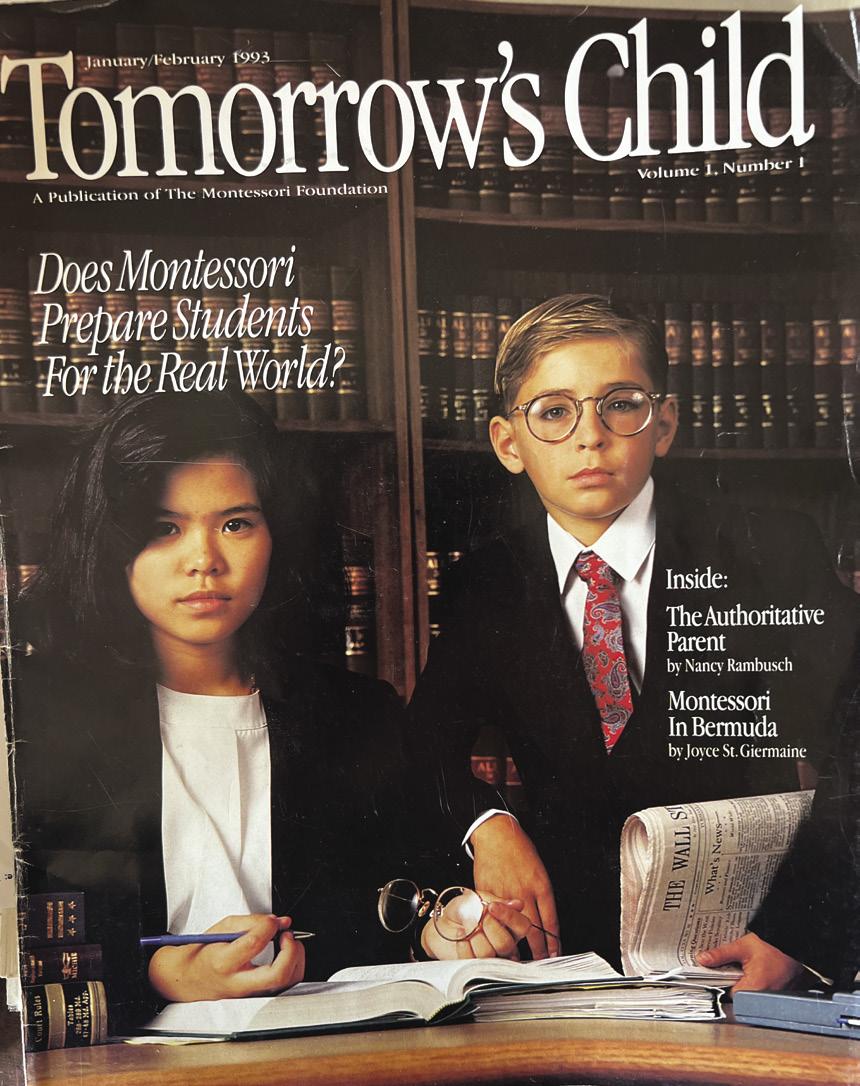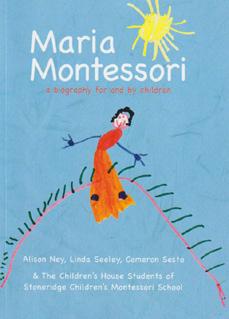
4 minute read
We're Celebrating The Gift of Montessori
By Tim Seldin, President The Montessori Foundation
The first issue of Tomorrow’s Child featured students Leslie Tam and Daniel “Robin” Howe from the Barrie School in Silver Spring, MD.
Editor’s Note: Celebrating the 30th Anniversary of the Montessori Foundation and its parenting magazine Tomorrow’s Child, we honor the many Montessori educators, administrators, and parents who have contributed to making this work possible. In the beginning, we called it “skyhooking,” working without the financial pursestrings that would normally be required for us to take on a project of this magnitude, asking for the investment of time and talent of writers, photographers, graphic designers, printing companies and, of course, Montessori school administrators, teachers, and parents who graciously allowed us into their classrooms and homes to tell the story of Dr. Maria Montessori and her “Method.” — Joyce St. Giermaine
The Montessori Foundation works with Montessori schools worldwide; however, most of the people we meet, while they may have heard of Montessori, they don't know much about it.
Most people think of Montessori as a prestigious preschool program. In fact, Montessori is the largest independent school network in the world, with more than 25,000 schools in 115 countries. After 116 years, Montessori extends through high school, and a growing body of research and successful alumni continue to lead to its worldwide growth.
Something happens in Montessori that we rarely see in other schools: enthusiastic, self-motivated children concentrating intensely on their tasks; a class culture of warmth, mutual respect, and a sense of individual freedom joined to deep, lifelong learning.
In most communities, you may find several distinctly different Montessori schools: public, private, charter, large and small.
Montessori is unique. It prepares students for college with an exceptionally high rate of college completion but with less stress than most students experience. There is a sense of family that's tangible, a sense of a caring community. You just need to talk to some Montessori students.
For example, when asked “Is this your class, a six-year-old told a visitor, “No, but I work here.”
Another was asked if it is true that in Montessori, students can do what they want. She responded: “No. We have a plan. But we do like what we do.”
As a Montessori high school graduate, recently wrote: “I spent 14 years in Montessori and can confidently say that it works. I went on to study engineering at Georgia Tech. It instilled a love of learning that will never go away.”
Montessori is a revolution in education that raises and educates successful, self-confident children who can meet the demands of an ever-changing world and global economy.
It’s common sense. In most classrooms, no matter how hard teachers work to differentiate instruction, the expectation is their children will master a specific set of skills and information in a given time frame. But children learn in different ways and progress at different paces. Great teachers follow the child.
Children do best when they feel safe, empowered, and heard. Montessori schools nurture students’ innate curiosity, creativity, intellect, and sense of engagement. Montessori students learn how to learn and develop executive function skills that lead to lifelong success. They are known for their kindness and character, global understanding, entrepreneurial spirit, and 21st-century leadership skills.
Ideally, students begin Montessori when they are very young — the years when a child's brain is most sensitive and open to stimulation.
Montessori tends to appeal to parents who never want their children to lose the joy of learning. Education should be a partnership between students and teachers, a journey, not a race. Montessori children want to go to school. They see it as their second home.
Tim Seldin is President of the Montessori Foundation and Chair of the International Montessori Council. His more than 40 years of experience in Montessori education includes 22 years as Headmaster of the Barrie School in Silver Spring, Maryland, his alma mater from toddler through high school graduation. Tim was Co-Founder and Director of the Institute for Advanced Montessori Studies and the Center for Guided Montessori Studies. He earned a B.A. in History and Philosophy from Georgetown University, an M.Ed. in Educational Administration and Supervision from The American University, and his Montessori certification from the American Montessori Society. Tim Seldin is the author of several books on Montessori Education, including How to Raise An Amazing Child and The World in the Palm of Her Hand. Look for his new book, Montessori for Everyone, co-authored with Lorna McGrath.










